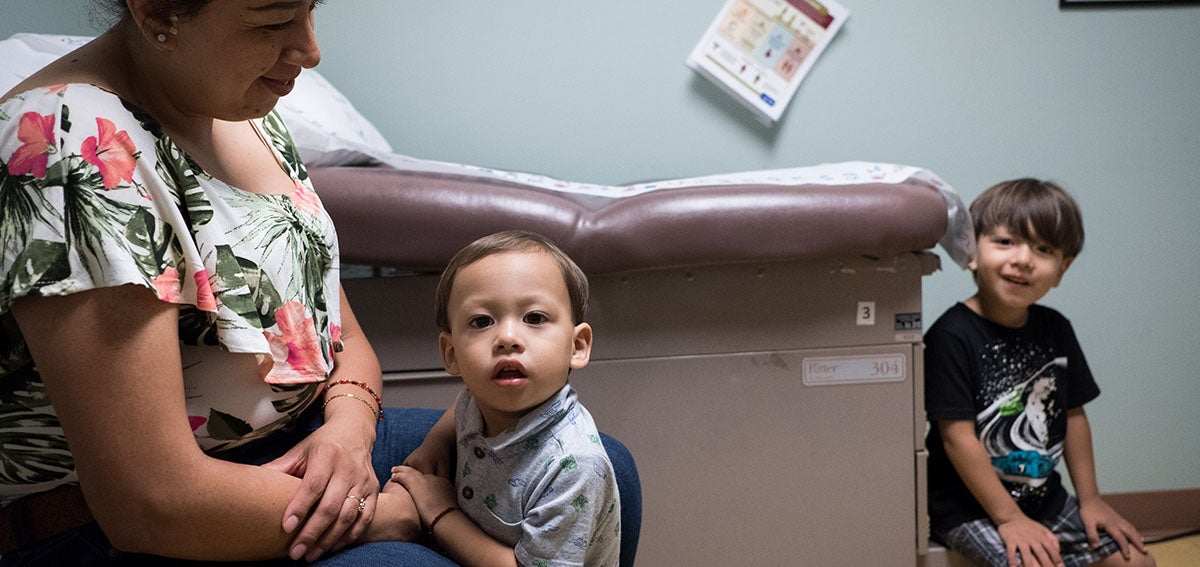
Immigrants may experience lifelong health consequences as a result of US immigration policy decisions, according to studies and analyses by US and Mexican researchers published in the journal Health Affairs last week. The July issue of Health Affairs focuses on borders, immigrants, and health.

Immigration policies, such as denying Medicaid coverage to noncitizens, increasing efforts to deport residents without documents, and making it more difficult for immigrants to become citizens if they use public benefits, can have myriad unintended consequences for the health of Latinx immigrants, researchers found.
Health Affairs Online Briefing
Health Affairs will highlight the content of its July theme issue on Borders, Immigrants & Health in an online briefing featuring key papers and authors. CHCF president and CEO Sandra R. Hernández, MD, will give remarks. Register now for the briefing on July 20, from 10:30 AM to noon (PT).
For instance, the Trump administration’s public charge rule allowed officials to deny green cards to people who might need help from programs such as Medicaid or Supplemental Nutrition Assistance Program. The rule, which was announced in October 2018, “likely caused 2.1 million essential workers and household members to forgo Medicaid and 1.3 million to forgo Supplemental Nutrition Assistance Program assistance on the eve of the pandemic,” wrote researchers Sharon Touw, Grace McCormack, David U. Himmelstein, Steffie Woolhandler and Leah Zallman. The Biden administration withdrew the rule in March 2021.
Other researchers reported that Latinx people, regardless of immigration status, avoided doctor’s offices because they were fearful in the wake of increased US Immigration and Customs Enforcement (ICE) activity. Abigail Friedman and Atheendar Venkataramani drew their conclusions after analyzing US Centers for Disease Control and Prevention survey data from 2011 to 2016 along with ICE requests for detentions in the same period.
That connection held true even for people with diabetes, who could suffer serious health consequences for skipping their semiannual doctor visits. The potential consequences include debilitating illness and the risk of premature death. “From the patient’s perspective, however, risks from detention and deportation, including potential loss of access to critical medications and insulin, may outweigh the cost of forgone care,” Friedman and Venkataramani wrote.
Though the researchers used data from before the pandemic, the article does offer some clues as to why COVID-19 hit the Latinx community particularly hard. “Although the researchers used data from 2011 to 2016, they noted that immigration detention and deportation activities grew substantially post-2016. That may help explain the high Hispanic mortality rates from COVID-19: delayed testing and treatment may have increased community spread,” the journal said in a press release.
Researchers also reported lifelong effects of immigration policies, such as long-term health consequences for the children of undocumented immigrants and decreased life expectancy in Latinx populations in counties along the US-Mexico border.
Haphazard System of Care for Children
Children who are undocumented are eligible for Medicaid and the Children’s Health Insurance Program (CHIP) on a state-by-state basis. Children not born in the US face some form of exclusion from the program in 48 states. (Undocumented children and young adults in California are eligible for Medi-Cal up to the age of 26.) Exclusions resulted in a far lower rate of insurance among children without citizenship, according to researchers from Rollins College and George Washington University. Mariellen Jewers and Leighton Ku compared children in families with some children who were citizens and others who were not. They found that children without citizenship are 26% less likely to be enrolled in Medicaid or CHIP than citizen children.
Noncitizen children were more likely to face “significantly more delays in needed medical care because of cost, primarily mediated by the lack of insurance coverage,” Jewers and Ku wrote. They also noted that Medicaid coverage for children effectively pays for itself in the form of better health, lower tax expenditures, and higher wages later in life. Conversely, because children who are undocumented generally become citizens as adults, “health barriers faced by immigrant children early in their lives may ultimately harm citizen adults.”
“Exclusionary policies against noncitizen children effectively harm our future citizens,” Jewers said in a Health Affairs press release.
Lack of Health Care for an Aging Population
Health care inequities among immigrants grew after the Great Recession and diminished after implementation of the Affordable Care Act, according to Arturo Vargas Bustamante, Jie Chen, Lucía Félix Beltrán, and Alexander N. Ortega in their Health Affairs article on the shifting demographics among immigrants to the US. Still, “unremitting inequities remain . . . particularly among noncitizen immigrants,” they reported.
Demographic trends will result in an aging uninsured population, the researchers found. Rather than returning to their home countries, immigrants are now staying put in the US as they grow older. This trend, along with fewer migrants coming to the US, means that undocumented immigrants are older on average — slightly more than 57% are now between 35 and 64 years old.
Without taking measures to address coverage gaps left by the Affordable Care Act, undocumented and uninsured immigrants will face significant health problems. Already, end-stage kidney disease is increasingly diagnosed in this community, and only one state, Illinois, covers kidney transplants, the only treatment for an illness that must otherwise be managed by dialysis.
“The US health care system is largely unprepared to deal with aging immigrants — particularly uninsured immigrants who live in states where they are ineligible for Medicaid — and undocumented immigrants who are ineligible for Medicare,” the authors wrote.
With comprehensive immigration reform stalled in Congress, one remedy would be for states to cover uninsured older Americans who are uninsured because they are undocumented, they said. California’s most recent state budget expands Medi-Cal to undocumented adults ages 50 and up.
Shorter Life Expectancy in Border States
Poor health and limited access to health care were most pronounced among Latinx people who aren’t proficient in English, according to the authors of the journal article “Health Care Spending and Use Among Hispanic Adults with and Without Limited English Proficiency, 1999–2018.” Sharing a language with a provider leads not only to “increased trust and greater patient satisfaction,” it also “decreases poor clinical outcomes due to miscommunication,” according to a recent research brief published by CHCF.
US researchers Keith P. Gennuso, Elizabeth A. Pollock, and Anne M. Roubal found lower life expectancies among Latinx communities than among other groups in regions around the US-Mexican border. American Indian residents in the border region also had lower life expectancies than White, Black, or Asian people in the region. Latinx people in border counties lived on average 1.4 years less than their White, Black, or Asian neighbors. They lived about two years less than Latinx people did on average in the US. Though the research did not seek to identify specific reasons for their shorter lifespans, the authors noted that Latinx people in the border region have been subject to centuries of discrimination that likely contributes to inequitable health outcomes.
California Focuses on Policy Solutions
Already, California has made policy changes that could positively affect the health of undocumented immigrants, such as California’s expansion of Medi-Cal to children of families with low incomes regardless of immigration status, according to researchers from San Diego State University.
The expansion was “associated with significant increases of about 9 and 12 percentage points in any coverage and public coverage, respectively,” wrote coauthors Brandy J. Lipton, Jefferson Nguyen, and Melody K. Schiaffino. “The estimated increase in any coverage translates to a 34% decline in the uninsurance rate relative to the pre-expansion rate among noncitizen children (26%).”
California’s 2020 expansion of Medi-Cal eligibility to undocumented young adults up to age 26 and this year’s state budget deal to add adults age 50 and over are also expected to improve access to health care.
Researchers Dolores Acevedo-Garcia, Pamela K. Joshi, Emily Ruskin, Abigail N. Walters, and Nomi Sofer also pointed to several potential policy solutions in their article, “Restoring an Inclusionary Safety Net for Children in Immigrant Families: A Review of Three Social Policies.” They suggest expanding existing federal policies to undocumented families with children, such as making “eligibility for tax credits and pandemic cash assistance . . . based on the health and developmental needs of the child, not the immigration status of the household” and ending the five-year waiting period for government assistance programs.
The July issue of Health Affairs was supported by the California Health Care Foundation, The California Endowment, and Con Alma Foundation.
Authors & Contributors

Heather Tirado Gilligan
Heather Tirado Gilligan is a journalist who has written for publications including Slate, The Nation, CNN, and the Washington Post. Previously, she was executive editor of the California Health Report, a news nonprofit covering disparities in health and access to health care. Heather received a master’s degree in journalism from UC Berkeley and a PhD in English from Rutgers University, where she studied race in American culture.

Jessica Brandi Lifland
Jessica Brandi Lifland is a freelance photographer, instructor of journalism at City College of San Francisco, and mother. Her work with publications and nonprofits such as Operation Smile, Tostan, and the California Health Care Foundation has taken her all over the world, including West Africa, the Middle East, Kosovo, Burma, Haiti, and South America.
For two decades she has been photographing the National Cowboy Poetry Gathering and has been working on a long-term project documenting the lives of the cowboy poets of the American West in affiliation with the Western Folklife Center. She plans to make her project into a book.





